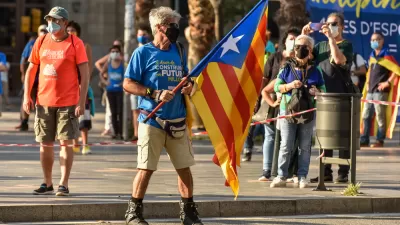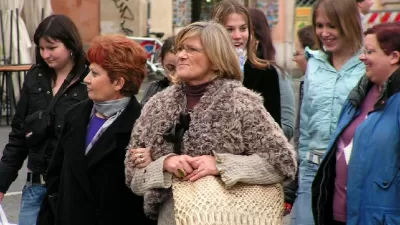Barcelona is planning to expand on its initial superblock experiment in an attempt to ease the stranglehold of car congestion and air pollution gripping the dense city.
"Barcelona's urban plan is the most ambitious thing going," according to this article by David Roberts. Those ambitions are defined on a global scale, and they center around a widespread expansion of the superblock concept that the country has been testing since 2016.
With this article, Roberts is launching a five-part series on the Urban Mobility Plan of Barcelona. Here's how Roberts describes the significance of the plan in the first article from the series:
The plan, which contains not only superblocks but comprehensive programs for green space, bicycle and bus networks, and much more, will not eliminate cars in the city, or deny one to anyone who needs one. But it will radically reduce their prevalence, the amount of space they occupy, and demand for their services. If it is fully implemented (a task that could take multiple administrations, even multiple generations), it could make Barcelona the first plausibly “post-car” major city in the world — a place where most streets are not for cars and most people don’t have one.
According to Roberts, Barcelona's new urban plan is a result of advocacy work and research by Salvador Rueda, founder of the Urban Ecology Agency of Barcelona, and planner working in Barcelona in some capacity for 40 years. "Now his vision for the city has found its way into an urban plan that has the backing of the current municipal administration. It is currently being implemented, with the audacious goal of replicating Barcelona’s five existing superblocks, ahem, 495 more times," according to Roberts.
The article frames Barcelona's plan to expand its superblocks as a process of reclaiming the city from cars—a task that will challenge and likely revise the plan's ambitions on the way to completion. Similar significance has been discussed as a response to the idea of implementing forms of congestion pricing in Manhattan and other cities around the country. Still, this is a local story, and Barcelona unique situation could enable it to become the first post-car city, according to Roberts.
FULL STORY: Cars dominate cities today. Barcelona has set out to change that.

Planetizen Federal Action Tracker
A weekly monitor of how Trump’s orders and actions are impacting planners and planning in America.

Chicago’s Ghost Rails
Just beneath the surface of the modern city lie the remnants of its expansive early 20th-century streetcar system.

San Antonio and Austin are Fusing Into one Massive Megaregion
The region spanning the two central Texas cities is growing fast, posing challenges for local infrastructure and water supplies.

Since Zion's Shuttles Went Electric “The Smog is Gone”
Visitors to Zion National Park can enjoy the canyon via the nation’s first fully electric park shuttle system.

Trump Distributing DOT Safety Funds at 1/10 Rate of Biden
Funds for Safe Streets and other transportation safety and equity programs are being held up by administrative reviews and conflicts with the Trump administration’s priorities.

German Cities Subsidize Taxis for Women Amid Wave of Violence
Free or low-cost taxi rides can help women navigate cities more safely, but critics say the programs don't address the root causes of violence against women.
Urban Design for Planners 1: Software Tools
This six-course series explores essential urban design concepts using open source software and equips planners with the tools they need to participate fully in the urban design process.
Planning for Universal Design
Learn the tools for implementing Universal Design in planning regulations.
planning NEXT
Appalachian Highlands Housing Partners
Mpact (founded as Rail~Volution)
City of Camden Redevelopment Agency
City of Astoria
City of Portland
City of Laramie




























